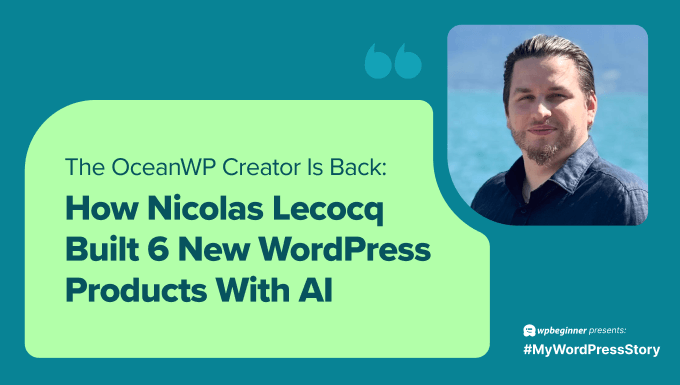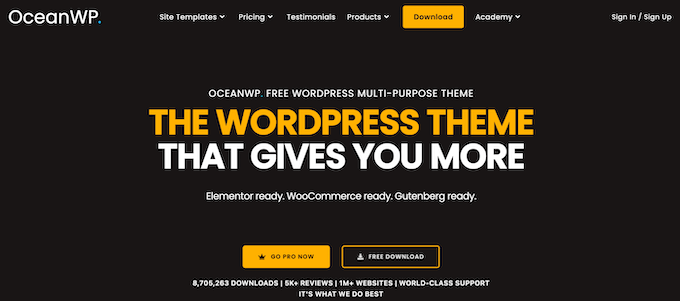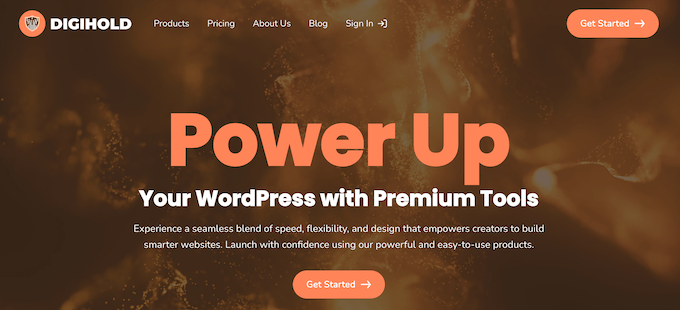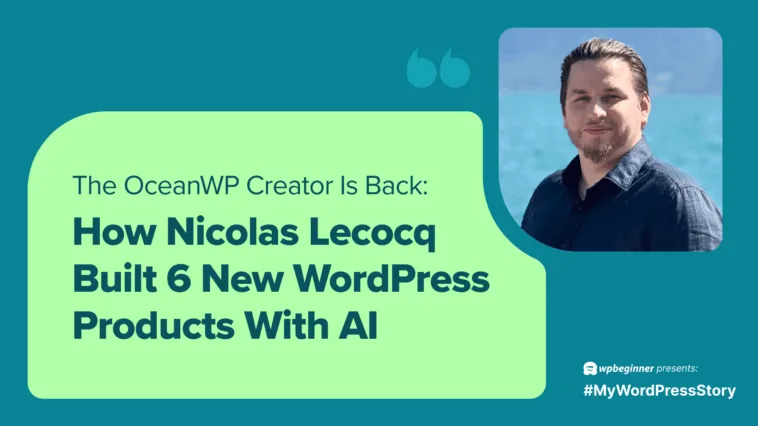If you’ve been part of the WordPress community for a while, then you’ve almost certainly heard of OceanWP. Launched as a free theme with premium-level features, it quickly became a staple for freelancers, agencies, and DIY site owners.
The creator, Nicolas Lecocq, stepped away from WordPress after selling the theme, only to return years later with a whole new approach to building products. This time, he’s creating faster and thinking differently about performance, user experience, and the role AI can play in development.
Under his new company, DigiHold, Nicolas has launched six WordPress products in less than one year — work he says would have taken him years before.
In this interview, Nicolas shares what’s possible when experience meets new AI tools and when you prioritize creating products that truly help customers.
“A product works when it solves a real problem… that’s what I focus on now.”
Nicolas Lecocq – Creator of OceanWP & Founder of DigiHold
Keep reading to get insider advice and tips from the creator of one of the most successful themes in WordPress history.
📣 This is our series, #MyWordPressStory, which brings you insights from some of the most successful leaders in the WordPress industry.
If you’d like to be featured in our interview series – whether you’re a plugin developer, founder, or SEO expert – feel free to reach out and let us know through our contact form.

📹 Video Interview with Nicolas Lecocq
If you’d like to check out our complete video interview with Nicolas Lecocq, then you can watch it below:
Or you can use the links below to see what we covered in the interview (and more):
🚀 Meet Nicolas Lecocq: From Sports Blogger to Self-Taught Developer
Nicolas’s journey with WordPress started in 2012, not with a business plan, but with a personal hobby.
His first blog focused on MMA sports, and although it didn’t last long, it introduced Nicolas to the flexibility of WordPress.
“I wanted to create a blog and I searched on Google ‘the best way to create a blog,’ and it was obviously WordPress.”
Nicolas Lecocq
Soon, he was tinkering with themes and experimenting with code. At the time, learning resources were far more limited than they are today.
Nicolas relied on a mix of YouTube tutorials, online forums, and something many seasoned developers still swear by: studying the code of other themes to see how they were built.
“I was watching YouTube videos, but there was not a lot of information like now… I learned really myself and little by little by editing themes.”
Nicolas Lecocq
His early freelance work involved making client websites responsive, back before mobile-friendly designs were the standard.
That process revealed an insight that would later define his career: every project seemed to require learning an entirely new theme.
Nicolas began imagining a single, versatile solution.
One theme that could handle any type of website — from eCommerce to real estate — while keeping a consistent workflow for developers and site owners alike.
That idea became OceanWP.
💥 Related Post: Tobias Bäthge turned a hobby project for his baseball team into TablePress, a WordPress plugin now powering 700K+ sites. Read the full interview to see how he did it.
📈 The OceanWP Phenomenon: When Free Beats Premium
OceanWP started as a way to streamline Nicolas’s client work.
Instead of adapting to a new theme for every project, he built one that could handle anything, and he knew it inside and out.
“When you have one theme to create anything, it’s easier for you when you know how to use it.”
Nicolas Lecocq
Originally, Nicolas planned to sell OceanWP as a premium theme.
But when his first attempt at a paid theme on ThemeForest didn’t gain traction, he decided to take a different approach.
He released OceanWP for free, but paired it with a companion plugin, Ocean Extra.

This allowed users to unlock the full potential of the theme without breaking WordPress.org guidelines.
They could access an unusually generous set of features for free at a time when most powerful themes were locked behind paywalls.
“I put so many free features… it was like a premium theme made for free. So everyone loved it.”
Nicolas Lecocq
Alongside these tools, Nicolas also launched premium OceanWP add-ons for paid features.
Growth was slow in the first six months, fueled mainly through word of mouth. But once it caught on, it grew very quickly.
Within a year, OceanWP went from a side project to one of the most popular themes on the market. With thousands of installs, Nicolas saw his OceanWP income jump from around $2–3K per month to $15K per month.
The combination of flexibility, rich features, and a free entry point made OceanWP a favorite for freelancers, WordPress agencies, and DIY site builders alike.
We can also vouch for the OceanWP theme. We’ve recommended it tons of times over the years for its versatility and complete feature set.
In fact, we often include it among our top choices for free themes in multiple categories. It even comes in at #4 on our list of the best free WordPress business themes.
🎯 Learning From Success and Setbacks
Building OceanWP gave Nicolas a crash course in what it takes to grow and sustain a popular WordPress product. Alongside the wins came valuable lessons.
One of the biggest? Performance matters.
“I added so much features I didn’t really think about performance… now performance is the first thing to think about.”
Nicolas Lecocq
Early versions of OceanWP packed in a huge list of capabilities, but Nicolas admits that some of those features slowed down websites.
💥 Related Post: Interested in learning more about WordPress website performance? Check out our ultimate guide to boost WordPress speed and performance.
Over time, user feedback helped shape improvements. This was feedback that came in through contact forms, WordPress.org forums, support emails, and even GitHub.
For Nicolas, those conversations weren’t just bug reports or feature requests. Instead, they were a roadmap for making the product better.
“It is your creation, but it’s their product. So you always need to listen to them.”
Nicolas Lecocq
After three to four years, he decided to sell OceanWP.
The experience had been formative, but he wanted to explore new ideas and address personal priorities.
His next project, Olympus, aimed to be faster and more focused than OceanWP. But just after launch, personal circumstances and partnership issues forced him to step away.
The setback reshaped how he approaches collaboration.
“I will not make my mistake with Olympus to do bad partnerships now. I’m very selective about who works with me.”
Nicolas Lecocq
From those experiences, Nicolas carried forward several important lessons: prioritize performance, build for user needs, and choose collaborators with care.
🤖 The AI-Powered Comeback: Building 6 Products in Under a Year
In 2024, Nicolas returned to WordPress development with a familiar starting point: freelancing and building websites for clients.
But he noticed something that would define his next chapter. Nearly every client wanted to sell something, whether it was services, eBooks, or eLearning content.
That observation became the foundation for his new company, DigiHold.

DigiHold is designed to cover eCommerce needs with the following products:
- DigiCommerce – A platform for selling digital goods, services, and online courses
- DigiBlocks – A collection of Gutenberg blocks for building high-performance sites
- DigiFusion – A minimalist WordPress theme with Pro features for full customization
Each product also has a Pro version, making a total of six releases, all built in under a year.
The difference this time? A performance-first approach paired with the power of AI.
“You cannot do coding without AI. It’s so much faster… it’s a game changer.”
Nicolas Lecocq
Nicolas leaned heavily on Claude AI, which he prefers over ChatGPT for development tasks.
His workflow involves training the AI on his codebase, asking it to help implement features, and then carefully reviewing every suggestion for performance, security, and user experience.
He was quick to emphasize that AI doesn’t replace the need to know how to code, but it amplifies it.
“Sometimes it tells me very bad things. And I know it’s not good, so I don’t do it,” Nicolas said.
🔮 Why AI Integration Matters: Building for Tomorrow’s Web
For Nicolas, AI isn’t just a behind-the-scenes development tool. It’s also something he’s actively building into his products.
DigiFusion Pro now includes integrations with ChatGPT and Claude, allowing users to generate content for blog posts and pages without leaving WordPress.
It’s part of his larger belief that website owners should be equipped to use AI in their own workflows, not just developers.
This focus on AI integration comes from a forward-looking view that the way people search the web is changing.
“You need to know how to implement SEO for AI because it’s the future… it’s happening.”
Nicolas Lecocq
Nicolas predicts that AI-driven search tools like ChatGPT will replace many traditional Google searches.
For developers and site owners, that means thinking about how to optimize content for AI. This is a shift he believes will become critical in the coming years.
“I think it will be easier to search on the web with ChatGPT, so people will use it more and more,” he said.
If you want to learn more about it, check out our beginner’s guide to generative AI optimization for WordPress.
By designing products with AI capabilities from the start, Nicolas is positioning DigiHold to be ready for that transition and helping his customers do the same.
💡 Product Philosophy & Developer Advice
If there’s one common feature with all of Nicolas’s products, it’s that they’re born from real-world needs, not trends.
DigiCommerce, DigiBlocks, and DigiFusion each came from solving specific problems his clients faced.
“A product works when it solves a real problem… if you just create it to earn money, I believe it will not really work.”
Nicolas Lecocq
That mindset shapes everything from his feature decisions to how he manages performance.
Although he believes strongly in the importance of user feedback, he’s not afraid to turn down requests that would slow down a site.
Instead, he prefers to offer workarounds via child themes or custom code.
“Performance and user experience have to be in mind when you build WordPress products now.”
Nicolas Lecocq
His development workflow is also lean and intentional.
He uses:
- Visual Studio Code for coding
- Local for staging environments
- Photoshop for design work
- ClickUp for organizing features, feedback, and ideas
- Claude AI as a coding assistant, but never as a replacement for core skills
For new developers, his advice is clear: master the fundamentals before relying on AI.
“You really need to learn code first, and then AI helps with your code.”
Nicolas Lecocq
That means starting with HTML, CSS, and JavaScript, understanding how things work, and then using AI to speed up and refine what you already know how to do.
💥 Related Post: Looking for more advice from founders? Check out our interview with Ionut Neagu, co-founder of Themeisle.
💭 Final Thoughts
Nicolas Lecocq’s story comes full circle, from teaching himself WordPress by editing themes to building one of the most popular free themes in the world.
Now, he’s returning years later with a new mindset and a powerful new toolset.
His journey is a mix of resilience, adaptability, and continuous learning. The setbacks he faced didn’t end his career. Instead, they reshaped how he works, how he chooses collaborators, and how he builds products.
Now, with AI as part of his daily workflow, he’s able to move faster than ever while keeping performance and user experience front and center.
But his advice to other developers is to see AI as an accelerator, not a replacement.
“For my six products, I believe I could have done them in some years manually. I did it in less than a year with AI.”
Nicolas Lecocq
For developers and entrepreneurs, Nicolas proves that strong skills, user feedback, and fresh tools can unlock new paths.
To learn more about what Nicolas is working on today, check out the DigiHold website.
📚 Bonus: Expert Resources for WordPress Developers
Looking to follow in Nicolas’s footsteps and build your own WordPress products?
These WPBeginner guides can help you get started:
If you liked this article, then please subscribe to our YouTube Channel for WordPress video tutorials. You can also find us on Twitter and Facebook.
